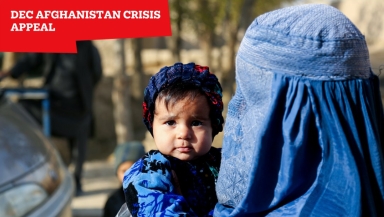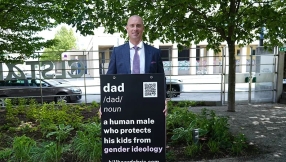
The Disasters Emergency Committee emergency appeal for Afghanistan that launched before Christmas has raised more than £30m thanks to the generosity of the UK public.
And after months of blockages due to frozen assets and international funding and a collapsing banking system with shortages of cash inside the country which had hampered the work of so many aid agencies, this funding can now get through.
Humanitarian assistance for the millions of Afghans who face acute food insecurity is now able to start and the immediate needs of the hungry and often homeless are an obvious priority. This is something to be celebrated.
As an aid worker, the frustration of seeing the need and not being able to help has been unbearable. Our local partners in Kabul, have been ready to respond but their hands have been tied. But as we finally start the important work of feeding, clothing and supporting as many people as possible, I cannot dismiss how I feel as a women's rights activist - as a woman full stop. The changes I have seen since August are devastating.
I have fought for women's equality for 25 years, working in senior positions, and yet now, I see no future for myself. This is the reality of being a woman and living in Afghanistan today.
Our daughters and granddaughters are no longer going to school or university. We are completely deprived of our rights now; to education, to healthcare. We are forced to stay at home, totally ignored. Female doctors, teachers, figureheads, all forgotten. Teachers are now selling their own clothes out of desperation. This is life in a dark situation.
I used to work alongside other women, visiting different projects and provinces, lobbying and working on women's economic empowerment projects; helping women to claim their rights. Now I work mainly from the confines of my home and often have to sit and monitor projects remotely or only visit them with a mahram (male companion) which can be challenging. As are all the women in our household, unable to gain an education or work in a way that enables us and our society to flourish.
My daughter is afraid. Anything can happen in Afghanistan now. She is in her first year of university, studying rights and diplomacy but despite the government promising to respect the rights of women, we hear many stories of attacks at schools, universities, on the roads. I can't help but think something will happen to her. It's not safe. Most girls no longer go to school, including my grandchildren, in case something happens. It was not like this before.
Whenever there is an explosion, we hear the stories. We feel helpless, waiting to hear who has been killed from our family and friends. We are just awaiting our turn. We think soon this will happen to us. These are terrifying moments that we experience a lot. In such situations, we try calling family members who aren't at home. If we don't hear from them then we start searching hospitals looking for their body. Can you imagine how hard that is? The mental strain, the trauma we are under. It's like being a dead body, just breathing but with no joy and happiness, no hope for the future as human beings.
Banks are still not functioning fully. We, as individuals, can only withdraw 5% of savings and because of the huge demand for cash, banks around the country and especially in Kabul are struggling to keep up and many are closed. It can take several days to withdraw any money. Kidnapping and robberies are increasing day-by-day. People are living in fear. We are really concerned about the winter months ahead. The days are getting colder and I'm witnessing suffering like never before: children begging on the streets, women standing on street corners, forced to sell their clothes in order to buy thick, winter blankets. We are faced with just two hours of electricity per day, so people are struggling to heat their homes.
Those who have fled the violence, are forced to live in tents. People are eating once a day. More and more people are facing hunger, particularly street workers, children, those without an income. These people are dying. When I go on to the street and see children begging and women asking for bread or selling clothes, and even their own children just to get the essentials to live, it breaks my heart. My daughter-in-law and I try to distribute clothes just to alleviate a minuscule amount of suffering.
There are no published statistics on what is actually happening to women's right activists, but we hear they are fleeing the country. We hear about the killings and I feel just terrified. I am not just scared for myself, as someone who could be targeted soon, but what that would mean to my family if I were. They would be deeply affected.
There are few women's projects now. Yet there is a huge demand for defending women's rights, for now and the future, so it's frustrating to feel so useless. I'm a mother of five children and with grandchildren too. Yet there is no option for me, or them, other than staying in and keeping a low profile. I cannot go to the media here, as they are looking out for people like me. I used to visit the market and venture out for things but I have to keep my family secure. Restrictions are affecting us all.
We are at a crisis point which means long-term development projects are vital. These needs are hard to ignore. But the government will only support emergency, humanitarian projects right now. We are doing our best to work under those restrictions and support people with their immediate needs. Through our local partners, we are providing winter kits with blankets, food, hygiene kits and essential nutritional packages for children, pregnant and breastfeeding mothers, alongside Covid awareness raising.
Women and children are particularly vulnerable. We are trying to remove any risk for female staff and the women we support. I can't even deliver food now, as a woman. We need female staff to ensure women get what they need but this isn't possible. Who knows what will happen with these kinds of restrictions, but we are trying, and we can only live in hope.
Christian Aid has been working in Afghanistan for over 30 years. To support its Afghanistan emergency appeal, visit christianaid.org.uk/appeals/emergencies/afghanistan-crisis-appeal.













